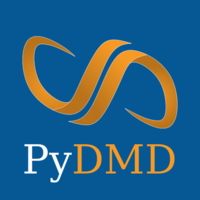| Line 1: | Line 1: | ||
{{preliminary}} <!-- Do not remove --> |
{{preliminary}} <!-- Do not remove --> |
||
| + | |||
| + | [[file:Logo_pydmd.png|200px|right|PyDMD logo]] |
||
| + | |||
[https://github.com/mathLab/PyDMD PyDMD] is a Python package that uses Dynamic Mode Decomposition (DMD) for a data-driven model simplification based on spatiotemporal coherent structures. DMD is a model reduction algorithm developed by Schmid [https://doi.org/10.1017/S0022112010001217]. Since then has emerged as a powerful tool for analyzing the dynamics of nonlinear systems. DMD relies only on the high-fidelity measurements, like experimental data and numerical simulations, so it is an equation-free algorithm. Its popularity is also due to the fact that it does not make any assumptions about the underlying system. See [https://doi.org/10.1137/1.9781611974508] for a comprehensive overview of the algorithm and its connections to the Koopman-operator analysis, initiated in [https://doi.org/10.1073/pnas.17.5.315], along with examples in computational fluid dynamics. |
[https://github.com/mathLab/PyDMD PyDMD] is a Python package that uses Dynamic Mode Decomposition (DMD) for a data-driven model simplification based on spatiotemporal coherent structures. DMD is a model reduction algorithm developed by Schmid [https://doi.org/10.1017/S0022112010001217]. Since then has emerged as a powerful tool for analyzing the dynamics of nonlinear systems. DMD relies only on the high-fidelity measurements, like experimental data and numerical simulations, so it is an equation-free algorithm. Its popularity is also due to the fact that it does not make any assumptions about the underlying system. See [https://doi.org/10.1137/1.9781611974508] for a comprehensive overview of the algorithm and its connections to the Koopman-operator analysis, initiated in [https://doi.org/10.1073/pnas.17.5.315], along with examples in computational fluid dynamics. |
||
Revision as of 10:20, 16 January 2019
 Note: This page has not been verified by our editors.
Note: This page has not been verified by our editors.
PyDMD is a Python package that uses Dynamic Mode Decomposition (DMD) for a data-driven model simplification based on spatiotemporal coherent structures. DMD is a model reduction algorithm developed by Schmid [1]. Since then has emerged as a powerful tool for analyzing the dynamics of nonlinear systems. DMD relies only on the high-fidelity measurements, like experimental data and numerical simulations, so it is an equation-free algorithm. Its popularity is also due to the fact that it does not make any assumptions about the underlying system. See [2] for a comprehensive overview of the algorithm and its connections to the Koopman-operator analysis, initiated in [3], along with examples in computational fluid dynamics.
In PyDMD we implemented the majority of the variants mentioned above with a user friendly interface. Moreover, we generated examples and tutorials to show the software capabilities.

